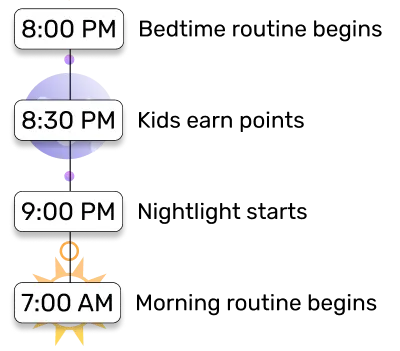From 2015 to 2016, over 7 million students missed 15 or more days of school. Even before the pandemic, you can bet the numbers were about the same. While there are legitimate reasons for missing school, many times, it can be tough to wrangle your kids in an organized fashion to get them to school punctually. And when that happens, you have no choice but to let them sit out for the day. A good way to stop this from happening is to create a daily schedule for kids. If you have no idea how to create a daily routine for kids, then don’t worry. We’ve got some great advice for you here, so read on to find out more!
Table of Contents
Read more: Free Printable Chore Charts with Pictures
How To Get Kids Interested in Schedules
We’ll be honest: when you go to your kiddos with a schedule, there’s a very good chance they’ll be resistant to it. Schedules are seen as boring, adult things, so your children might not be interested in learning about them at all.
To help you out, here are some ways to get your kids interested in daily schedules.
Gamify the Experience
Gamifying something is to turn it into a game; you can already see how this is much more interesting to children! In fact, studies have shown that gamification can increase retention by 12.23% and overall performance by 7.03%!
Turning tasks into objectives in a game can make your kids more motivated to complete them. Instead of mundane chores, if you present them as objectives with points to be earned, your kiddos will feel a sense of accomplishment as they rack up those points. They’ll want to collect even more points, which can help keep them on track with their daily schedule!
Read more: How to Make Daily Schedule for Kids at Home That They’ll Actually Follow
Give Out Rewards
Gamification can already get your children revved up to check off the tasks on their daily schedule. But you can motivate them even more by giving out rewards for those points they’ve collected!
For example, you can reward your kids with a small toy if they’ve kept up with their daily schedule for a week. Or you can take them on an outing if they’ve kept up for a month.
Goally | The Safest Tablet for Kids
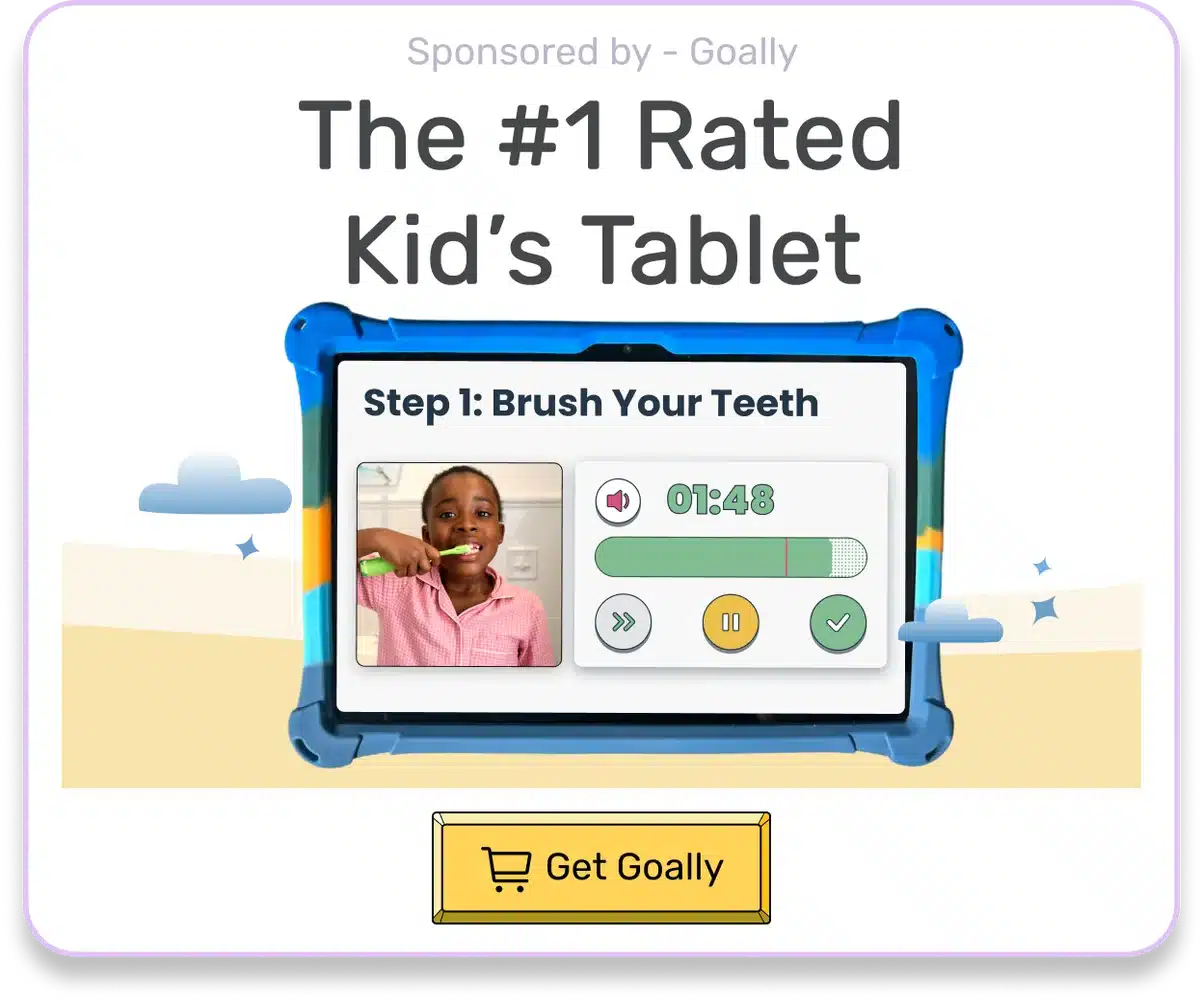
This process can be difficult to keep up with manually, so we suggest using some tech like Goally. With our device and suite of apps, you can set up a points system (reward sizes and point values) and Goally will take care of the rest!
Let Them Be Independent
As kids grow older, they tend to resist doing things just because you’re constantly giving them instructions and hovering over them. It’s a normal part of growing up! At this stage, it’s best to give them some space and allow them to be more independent.
You might be worried that without some parental control/direction, your kids will run rampant. But the opposite is true! Letting your kiddos be independent shows that you trust them, and they’ll be motivated to show you that trust is well placed.
Using a device like Goally can help your children build their independence skills. Our device will show them what they need to do in their routine and will remind them to get those tasks done through sounds and timers. That way, you won’t have to nag them!
Make Age-Appropriate Schedules for Kids
Creating a daily schedule for kids gets easier when you take into account their age and tailor it accordingly. Remember, there’s no one-size-fits-all solution when it comes to kids’ schedules, and focusing on age-appropriate tasks is essential for their productivity.
That’s where Goally comes in! With a visual schedule, checklists, and daily task reminders, it’s easy to set up custom routines specifically designed for your child. Not only does this help keep your little ones on track, but it also ensures they successfully complete their tasks with minimal fuss. So whether you’re dealing with a toddler or a teenager, Goally is here to help make their daily schedule a breeze.
Don’t know where to start? Here are some example schedules you can use to learn how to create a daily schedule for kids.

Read more: Best Weather app for kids
Daily Schedule Templates for Kids Ages 0-4
At these ages, your little ones won’t be able to process too much, so try and keep the daily routine simple. Here are some tasks you should include:
| Time | Activity |
|---|---|
| 7:30am – 8:00am | Wake up |
| 8:00am – 9:00am | Eat breakfast |
| 9:00am – 11:00am | Playtime and exercise |
| 11:00am – 12:00pm | Special activities and errands |
| 12:00pm – 1:00pm | Lunch |
| 1:00pm – 3:00pm | Naptime |
| 3:00pm – 4:30pm | Snack and playtime |
| 4:30pm – 6:00pm | Dinner prep and dinnertime |
| 6:00pm – 7:00pm | Family time |
| 7:00pm – 7:30pm | Bed prep and bedtime |
Of course, we all know babies and toddlers can be fussy, so don’t feel too bad about not sticking to the schedule strictly. Also, they won’t be able to independently keep up with the daily schedule, so it’ll be up to you.
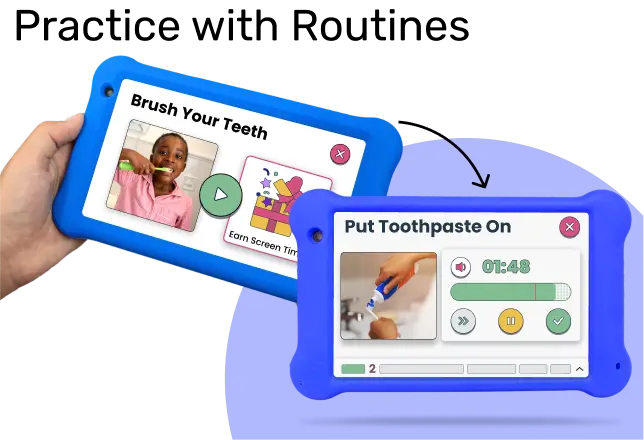
Daily Schedule Templates for Kids Ages 4-10
From age 4 on, your kiddo will start showing their personality, as well as some independence. So try and have them follow this schedule, or something similar:
| Time | Activity |
|---|---|
| 7:00am – 8:00am | Wake up and eat breakfast |
| 8:00am – 9:00am | Free time |
| 9:00am – 2:30pm | School |
| 2:30pm – 4:00pm | Outside play |
| 4:00pm – 5:00pm | Homework |
| 5:00pm – 6:00pm | Dinner prep and dinnertime |
| 6:00pm – 7:30pm | Family time |
| 7:30pm – 8:00pm | Bed prep and bedtime |
Daily Schedule Templates for Kids Ages 11-16
As preteens and teenagers, your kids will definitely want to be independent. Don’t try to force a schedule on them, but instead, encourage them to get into a routine that’ll make them more productive.
A good schedule for this age group looks like this:
| Time | Activity |
|---|---|
| 7:00am – 8:00am | Wake up and eat breakfast |
| 9:00am – 2:30pm | School |
| 2:30pm – 5:00pm | Homework and outside play |
| 5:00pm – 6:00pm | Dinner prep and dinnertime |
| 6:00pm – 7:00pm | Family time |
| 7:00pm – 9:30pm | Free time |
| 9:30pm – 10:00pm | Bed prep and bedtime |
You’ll notice that there are 2 huge chunks of time for homework, outside play, and free time. You can leave it up to your teen as to when they’ll want to do each activity, depending on their energy levels throughout the day.
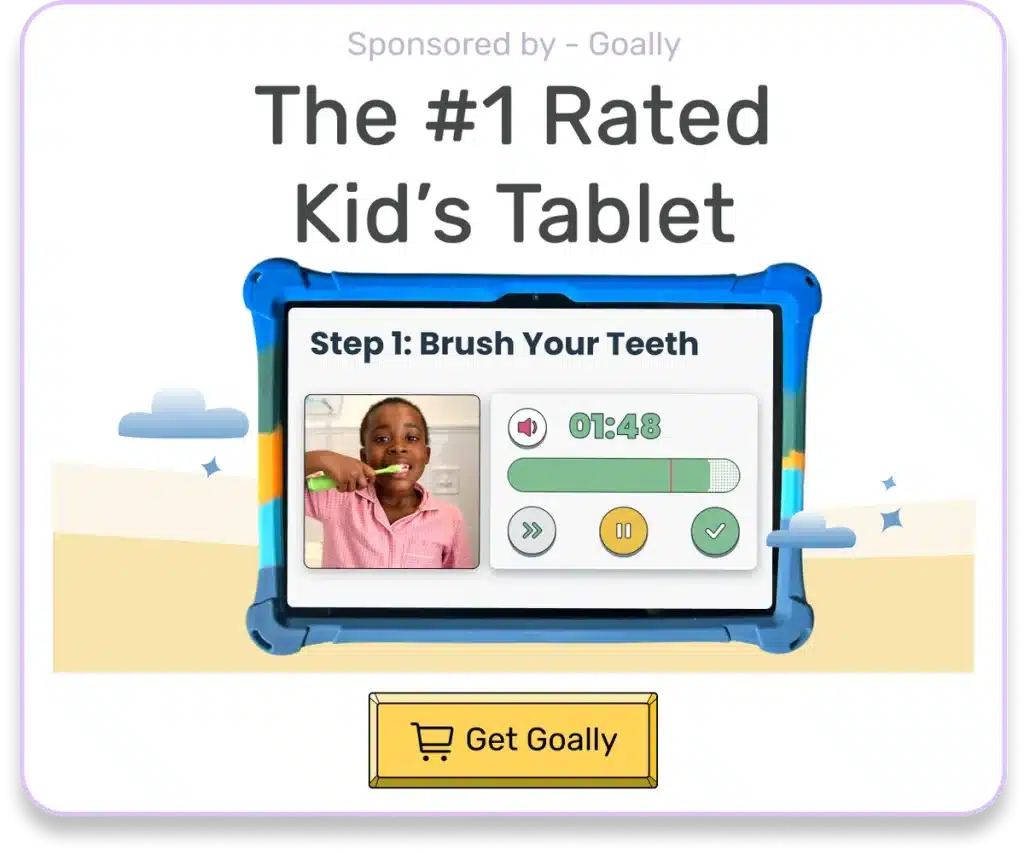
Goally | Apps That Build Behavior & Life Skills for Kids
Want to keep your child motivated while building essential behavior and life skills? Goally’s skill-building tablet is designed to celebrate small wins and help your child grow.
Our Behavior Tracker helps you reward your kiddo for specific skills, like “being kind” or “flushing the toilet.”
By setting clear expectations and rewarding their efforts, you foster a positive environment for your child to flourish in their behavioral skills journey.
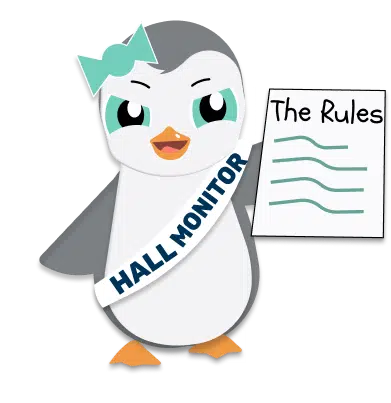
Create an Effective and Fun Daily Schedule for Kids
A daily schedule for kids can really help your family get into a routine and to school on time. If you’ve tried in the past to create a daily routine for kids but failed, don’t give up. With this helpful guide, you should be able to get your children on a good routine that’ll ensure they’re rarely late to school or any other appointments! Want some help creating your kids’ daily schedule? Check out Goally now!
FAQs About Daily Schedule for Kids
Why is a daily schedule important for special needs kids? A daily schedule can help provide structure and routine for special needs kids, which can be very beneficial for their development and wellbeing. It can also help them feel more in control and reduce anxiety. What should be included in a daily schedule for special needs kids? A daily schedule for special needs kids should include regular activities such as meals, playtime, therapy sessions, and school work. It's also important to factor in any sensory needs, such as quiet time or time for movement breaks. How can parents or caregivers create a daily schedule for special needs kids? To create a daily schedule for special needs kids, parents or caregivers should first assess the child's needs and preferences. They can then use a visual schedule or planner to outline the day's activities and set clear expectations. What are some tips for sticking to a daily schedule with special needs kids? To stick to a daily schedule with special needs kids, it's important to be consistent and flexible. It's also helpful to involve the child in creating the schedule and to build in breaks or downtime as needed. How can a daily schedule benefit the whole family? A daily schedule can benefit the whole family by reducing stress and chaos, improving communication, and promoting a sense of teamwork and collaboration. It can also help parents or caregivers feel more organized and in control of their day.
This post was originally published on 02/14/2022. It was updated on 02/01/2024.

Goally
We help parents teach their kids life skills, like doing bedtime and morning independently. Backed by science, we incorporate evidence-based practices and expert-informed designs in all of our apps and content.
